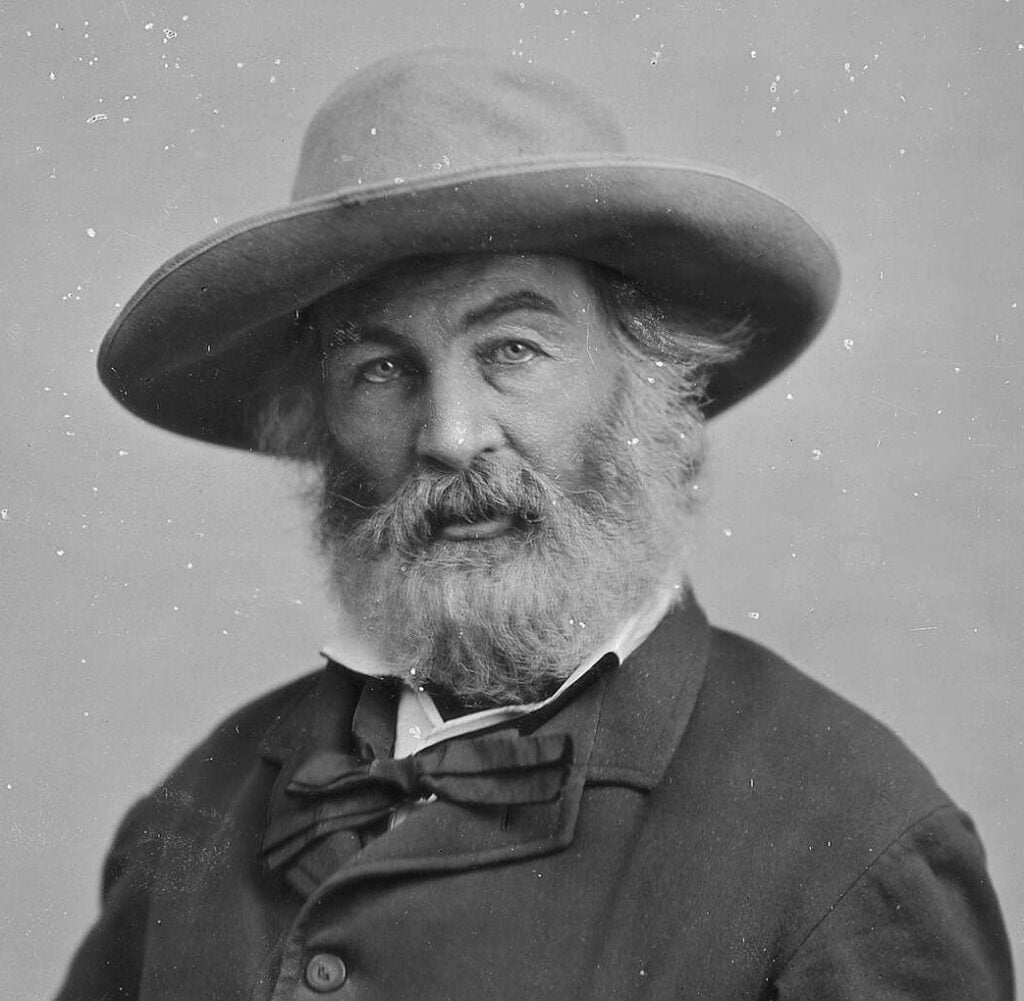"O Captain! My Captain!"

Walt Whitman
Biography
- Walt Whitman was born on May 31, 1819, in West Hills, on Long Island, New York.
- Died: 26 March 1892, Camden, New Jersey, United States.
- He was the second son of Walter Whitman, a house-builder, and Louisa Van Velsor.
- In the 1820s and 1830s, the family, which consisted of nine children, lived in Long Island and Brooklyn, where Whitman attended the Brooklyn public schools.
At the age of twelve, Whitman began to learn the printer’s trade and fell in love with the written word. Largely self-taught, he read voraciously, becoming acquainted with the works of Homer, Dante, Shakespeare, and the Bible.
Whitman worked as a printer in New York City until a devastating fire in the printing district demolished the industry. In 1836, at the age of seventeen, he began his career as teacher in the one-room schoolhouses of Long Island. He continued to teach until 1841, when he turned to journalism as a full-time career.
Poem
O Captain! my Captain!our fearful trip is done,
The ship has weather’d every rack, the prize we sought is won,
The port is near, the bells I hear, the people all exulting,
While follow eyes the steady keel, the vessel grim and daring; But O heart! heart! heart!
O the bleeding drops of red,
Where on the deck my Captain lies,
Fallen cold and dead.
O Captain! my Captain! rise up and hear the bells;
Rise up—for you the flag is flung—for you the bugle trills,
For you bouquets and ribbon’d wreaths—for you the shores a-crowding,
For you they call, the swaying mass, their eager faces turning;
Here Captain! dear father!
This arm beneath your head!
It is some dream that on the deck,
You’ve fallen cold and dead.
My Captain does not answer, his lips are pale and still,
My father does not feel my arm, he has no pulse nor will,
The ship is anchor’d safe and sound, its voyage closed and done,
From fearful trip the victor ship comes in with object won;
Exult O shores, and ring O bells!
But I with mournful tread,
Walk the deck my Captain lies,
Fallen cold and dead.
Summary

Stanza – 1
In the first stanza, Whitman calls upon the Captain (Lincoln) of the Ship (USA) that ‘fearful trip’ (dreadful Civil War) has come to an end. The people have won the victory at last, which they quested for i.e. the victory of the union.
Poet tells the captain that port (home) is very near and now he can hear the sound of temple bells and the cries of the enthusiastic people who are eagerly waiting for him. The enthusiasm increases as the ship reach near the port. Keel has been thrown off the ship so as to keep ship stable.
In the next lines, this enthusiasm is replaced by gloom. The captain is dead now and blood is oozing from his body. This makes the poet exclaim ‘O heart! Heart! Heart!’ The captain, who was supposed to be praised by the people for his peerless bravery is now lifeless and motionless.
Stanza – 2
In the second stanza, Whitman tries to talk to the Captain, who, he knows well, is dead. This technique of talking to the dead is called apostrophe. The poet asks the captain to rise up as for him, bells are being rung, flags are being hoisted, musical instruments are being rung, flowers are being curled etc.
The people are eagerly waiting for his arrival, but he is dead now. It should be noted that the captain is dead now and hence these ceremonies are of his funeral. The poet goes in reminiscence and tries to consider this death to be fancy but at last, he has to believe that Captain is dead. Poet calls him father because, for him, Lincoln is not just a military leader but the father of the nation and laments over his loss.
Stanza – 3
In the third stanza, we find the duality of emotions. Whitman experiences the euphoria of their victory but at the same time laments over the death of Lincoln, which is a big loss for the nation. The poet says that now the captain is dead. His lips are pale. He can neither feel the arms of the poet not his heart is beating.
It is such a time when the ship has arrived at its destination. The ‘fearful trip’ i.e. horrors of the Civil War is over now and there is relief among the people. People are rejoicing but the poet is mourning over the death of Lincoln. The ‘deck’ here refers to the cemetery of Lincoln. Poet, moving around this place, laments over his death. Hence the poem ends with both victories as well as loss.
